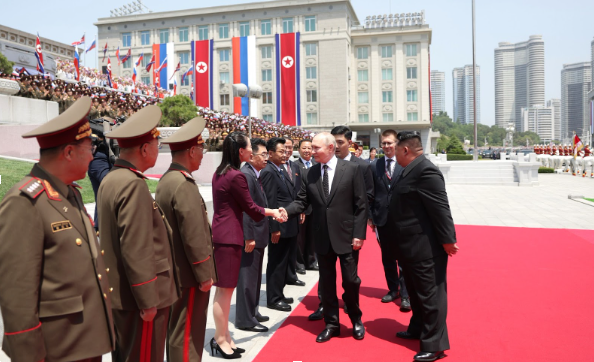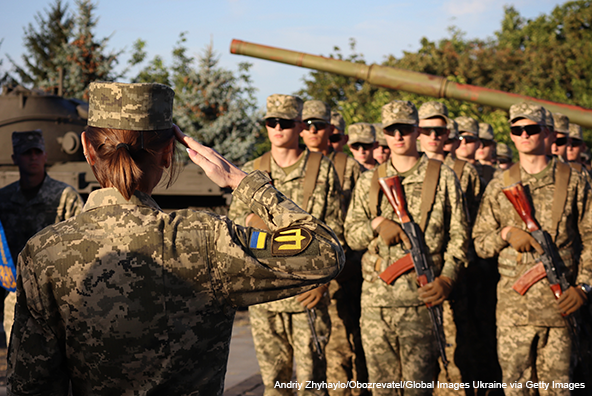Desperation or Deliberate Escalation? North Korean Soldiers in the Ukraine War
6 mins - by Anna-Magdalena Glockzin
First rumours about potential North Korean troops being shipped to Russia in order to be later deployed in the war against Ukraine hit the news about four weeks ago. At that time, there were hardly any public reactions to this piece of information because Western leaders wanted to wait for verification of these claims by intelligence services. Russia and North Korea demented the accusations, calling it “another hoax” (Russia) and “groundless, stereotype rumours” (North Korea). However, it was later confirmed by various intelligence agencies that indeed about 10,000 North Korean troops have been shipped to Russia with the plan of training them, and subsequently deploying them in the Ukraine war. This raises the question of the motives behind Russian President Vladimir Putin’s decision and what it means for Ukraine. Moreover, since the European Union (EU) is a strong supporter of Ukraine with regard to military and economic aid, what are the implications of this development for the EU itself and its actions towards Ukraine?
Vladimir Putin in Pyongyang, North Korea, June 2024
By Kremlin.ru, CC BY 4.0, https://commons.wikimedia.org/w/index.php?curid=149529530
Moscow and Pyongyang have advanced their anti-US military partnership in recent years, leading to increased concerns among Western leaders. The agreement to send 10,000 North Korean troops to Russia seems to be the latest development of that partnership. North Korea has one of the largest militaries with 1.2 million soldiers, but those soldiers are more or less untrained since the army’s last major deployment was during the Korean War from 1950 until 1953. According to the South Korean intelligence service, the North Korean troops received Russian uniforms, weapons as well as forged identification papers in order to make them appear as Eastern Siberians. At the end of October, there were consistent reports that a majority of those troops had been transferred to Kursk. Kursk is a Russian region at the border with Ukraine, where fighting still continues after a Ukrainian incursion in the beginning of this August.. Only a few days later, the Ukrainian military described how they clashed with North Korean soldiers for the first time in the Kursk region. But why would Russia and North Korea engage in this endeavour and what do they stand to gain from it?
Russia suffers severely from its casualties on the front lines. Over 60,000 Russian troops have been killed and wounded since the full-scale invasion in February 2022. To put it pragmatically, Putin needs soldiers to fight his war and Kim Jong-un can provide them. Additionally, North Korean fighters cost Putin very little - $2,000 a month per person. In return, Kim gets food and other necessities for his isolated country. Furthermore, Kim’s troops might gain experience in combat and technical training, further enhancing their capabilities and bringing them up to speed with the current state of warfare. This is very dangerous because Kim would not only have one of the world’s largest army but they would also be skilled and trained in combat. North Korea would be able to deploy them in the conflict on the Korean Peninsula, increasing the risk of escalation in the hostilities. However, it cannot be denied that the deployment of North Korean troops in the Ukraine war also appears as a sign of Russia’s weakness because it shows Putin’s desperation to continue the war, even though he does not have enough resources to carry this out.
And how has Ukraine reacted? Ukrainian intelligence was among the intelligence services which reported on the transfer and deployment of North Korean soldiers, so they knew about it right from the beginning. They called attention to the danger and the fatal consequences for the Ukrainian military associated with the additional 10,000 soldiers coming into the war. Furthermore, the Ukrainian president Volodymyr Zelenskyy called Western leaders out, defining their reaction as not “strong enough”. In light of this, Zelenskyy was keen to remind Western leaders of the discussions around the provision of long-range weapons, which would be able to strike targets in Russia. Because the West fears that could be regarded as escalation, leaders have thus far refused to supply those weapons. The Ukrainian president clearly stated that “the North Korean soldiers entering war is escalation,” emphasising that Russia is the partyb which is responsible for further expansion of the conflict, and that providing long-range weapons would be the appropriate reaction. The Ukrainian side grew more and more frustrated with the silence and the cautiousness with which its allies reacted to this new serious development, saying that “America is watching, Britain is watching, Germany is watching [and] everyone is just waiting for the North Korean military to start targeting Ukrainians.”
Indeed, when looking at EU officials and other European leaders, their reactions have been cautious and scarce. Only on November 4, the High Representative of the Union for Foreign Affairs and Security Policy Josep Borrell visited Seoul and met South Korean Foreign Minister Cho Tae-yul to discuss the implications of North Korea’s involvement. They issued a joint statement, in which they condemned “in the strongest possible terms” the deployment of North Korean troops and voiced their concerns about potential technology transfers with regard to (nuclear) missiles. Lithuanian Foreign Minister Garbielius Landsbergis, on the other hand, expressed that it is important now to reconsider a topic, which was first brought up by French President Emmanuel Macron: the deployment of European troops in Ukraine. The Estonian member of the European Parliament Riho Terhas agrees with that view and highlights the importance to “have this at least as an option.”
Other European leaders have also voiced their concerns over North Korea’s involvement in the Ukraine war. During the visit of the German Foreign Minister Annalena Baerbock in Kyiv on the 4th of November, she and her counterpart Andrii Sybiha discussed “the need for decisive action.” Sybiha added that Europe has “to realise that the DPRK troops are now carrying an aggressive war in Europe against a sovereign European state”, further emphasising the severeness of the situation. Similarly, the new Secretary-General of NATO Mark Rutte wrote an opinion piece in the POLITICO magazine about the North Korean troops in Europe being “a turning point”. He highlights how the soldiers from North Korea escalate the war and that this shows the global (and not regional) nature of Europe’s and the West’s security. Thus, a deeper relationship with Indo-Pacific partners is needed.
In conclusion, it can be said that the deployment of North Korean troops in the Ukraine war is another escalation in the conflict. It brings an additional party on the ground of the war, forcing Ukraine to deal with the danger of 10,000 more soldiers. At the same time, it comes at a comparably low cost for Putin and Kim, since they gain a lot strategically and economically from deepening their ties and further destabilising global security. The EU, however, has only partly and hesitantly acknowledged that this new development is indeed an escalation. The additional 10,000 troops that the Ukrainian army has to fight and for which it needs further military support from Europe is only one implication. The other consequence relates to an even larger scale. A strong Russia-North Korea relationship might increase North Korean capabilities in combat and thereby impact the situation on the Korean peninsula. In order to counter this, close cooperation and deep ties with EU’s Indo-Pacific partners is indispensable, also to ensure their support for Ukraine. It is crucial that the support for Ukraine remains steady because it is about Europe’s security and peace after all.

